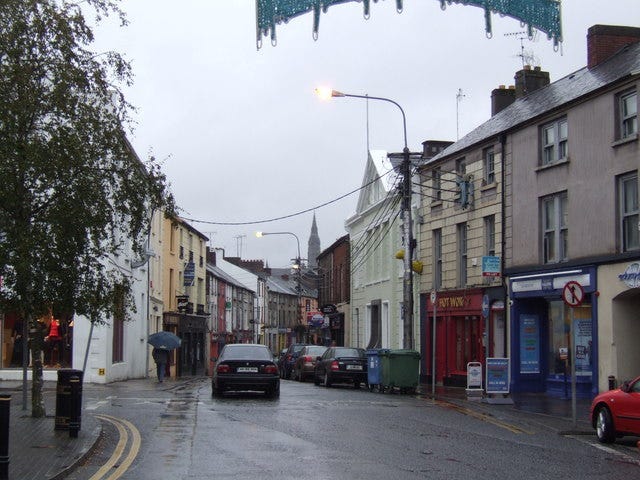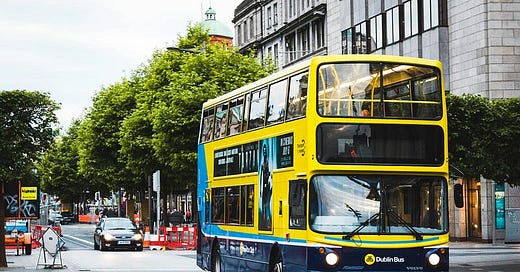Why The Irish Are Fleeing Ireland
In the world's greenest country, the young seek greener pastures abroad
When I was approaching the end of high school in a small (Northern) Irish town, a lot of grown-ups asked me something like this:
“Are you thinking of university, or Australia?”
It’s a strange question — were those really the only two options available to an 18-year-old finishing school? Well, it sure felt like they were the only options worth considering. Not trade school, not the military, not working for the family business, not moving to a bigger city; just university, or Australia.

The statistics show that emigration is a uniquely Irish affair — Ireland has the highest share of its population living abroad of any OECD, ahead of rivals like Portugal and Mexico.
The Irish government believes that around 1.47 million Irish citizens are living abroad, which doesn’t include the population of Northern Ireland (all of whom are entitled to Irish citizenship), nor does it include the 70 million or so around the world who claim Irish ancestry, mostly in the US. The Republic of Ireland, for context, has a population of 5.1 million.
Yet on paper, there should be no reason for Irish people to move abroad. The Irish economy is supposedly flourishing, and it’s considered one of the most peaceful countries in the world. It has an extraordinarily rich culture, beautiful natural landscapes, adorable villages, and some of the most charming people you’ll find anywhere (if I do say so myself).
So why does nobody want to stay? Why do at least 30,000 new Irish flee every year from a country apparently in its golden age?
Let’s start with a little history. Irish people have a long record of emigration, largely driven by the pressures of English occupation, overpopulation and famine. Right before the Great Famine of the 1840s, the island’s population probably stood at around 8.5 million; between 1901 and 1971, that figure fell to about 4.5 million or less. About 1 million died from starvation and sickness but the rest migrated, mostly to Britain and the US.
Today, the island has over 7 million people; steady population growth finally returned in the 1970s, when Ireland joined the European Community. The economic boom since then has been miraculous, turning Ireland from rural backwater to the tech capital of Europe, and attracting significant numbers of immigrants. Yet the exodus of young Irish, although a little slower today than in the past, never actually stopped.

In part, that’s because emigration is part of Irish culture now, just as much as Guinness or stepdance. Ireland’s economy has been growing for 30 years, and Japan’s has stagnated over the same period, but both countries see roughly the same number of people leave every year (about 30,000; Japan has ~125 million people). Leaving Japan is a huge deal, something that will shock friends and family; leaving Ireland is totally ordinary.
The main change over the generations has been the places where the Irish move to. While at one point the vast majority went to America, it’s much less popular today due to the strict visa regime*, while the EU, the Arabian Gulf, and Australia have all become more popular (God bless air-conditioning).
*fun fact: the US green card lottery was invented by Irish-American senators to make it easier for Irish to migrate

For some, the move is temporary. You might go to Dubai for a couple of years to save money for a house back home; you might teach English in Spain or Korea to explore a bit of the world and learn a language; you might go to England to get some experience at the beginning of your career before finding a more permanent job closer to home; you might go to Australia to find work when there’s a recession at home.
But many see no reason to go back. Plenty of Irish get a working holiday visa for Australia or Canada or New Zealand, officially to combine casual bar work with some backpacking, and then spend their time in the country searching for a work sponsor so that they can stay long-term. In the US, the difficulty of acquiring or renewing a visa has led to an estimated 50,000 undocumented Irish (and 16,000 children), in addition to the large legal population.
So is all this migration motivated by wanderlust and cultural interest? Are thousands of Irish risking arrest and deportation for American sunshine, Australian surfers, and Canadian maple syrup?

Not exactly. Lifestyle is a huge consideration, and Ireland will never have a city as big as New York or the sun, sand and surf culture of Australia, but much of the migration out of Ireland can be explained by failure of the state.
The strange thing about Ireland’s economic boom is how little it has to do with the Irish people and society.
Post-World War 2 Japan and post-Communist Poland both enjoyed economic growth by leveraging the talents of their societies. The intense work ethic and attention to detail of Japanese factory workers and engineers created reliable cars that sold well globally; Poland’s excellent science education and army of passionate video gamers allowed it to become a leader in the European tech sphere.
But if you’ve ever wandered around rural Ireland searching in vain for an economic signal, or tried to show a 50-year-old woman how to skip a YouTube ad, you may be forgiven for wondering “How the hell did this country become the heart of the European tech industry?” Is there really nowhere better for Google, Facebook, Airbnb, PayPal and Microsoft to have their European headquarters?

The answer, of course, is that Ireland is the world’s most important tax haven, and the American multinationals would base themselves in a swamp if it meant dodging taxes.
Yet this poses a problem — Ireland, a country where most kids leave school without knowing how to open an Excel spreadsheet, simply doesn’t have enough tech developers, product managers or SEO optimizers to fulfil the needs of the tech giants. Nor does it have enough MBA graduates for Accenture, or world-leading biotech researchers for Medtronic, or enough skilled workers for any of the multinationals based there.
The result is that many of the best jobs go to better-qualified immigrants from India, Israel, Lithuania, California and so on, while the Irish build the offices, staff the call centres, or move to Australia where manual labour is significantly better-paid and usually comes with a more relaxed work environment.
The situation is slowly improving, and there are now a fair number of Irish-born workers at desks in the tech giants, but the uncomfortable truth is that Ireland’s education spending is the lowest in the OECD as a share of GDP, so very few Irish will ever earn €15,000 per month as software engineers at Google or Facebook. Earning €2,200 as a bartender while paying half of it for a room in Dublin is a more realistic prospect.

And that brings us on to the Irish housing crisis. Basically everywhere in the developed world has a housing crisis right now, but the one in Ireland (and especially Dublin) is a strong contender for the worst on the planet. Two-thirds of young adults still live with their parents, with home-ownership seeming roughly as realistic as time travel or telekinesis.
You could remain in Ireland by staying outside Dublin, but Ireland is decidedly not the most cosmopolitan country on the planet. Beyond the handful of small, expensive cities like Cork and Galway, your only real option for building a future and raising a family is one of the hundreds of small towns and villages where buses are a rare sight after 7 pm.
An older Irish woman protested online recently that young Irish people could balance home-ownership and “a vibrant social life” by choosing to live in places like Letterkenny (23,000 people) and Monaghan Town (8,000).

Now, I’m sure these towns have a nightlife that rivals New York and Melbourne, but let’s just say that your options for judo clubs, salsa classes, improv groups, board game meetups and tennis matches are limited. Some lucky towns do have football pitches, but these will be closed for flooding when it rains heavily, which is a … reasonably common occurrence in Ireland

Most of these problems are fixable. We don’t expect the politicians to fix the rain, but they could:
invest in a real public transport network (or at least go back to 1969 and re-legalise drunk driving)
build sports and leisure facilities so teenagers have something to do other than drink in parks and kick over bottle banks for fun
invest in tech, science and business education so that Irish people might be realistic candidates for the good jobs in Ireland
build lots of houses — yesterday
Unfortunately, many of these changes would require the Irish government to have lots of money lying around … which it actually does.
Unusually for a Western country, Ireland generates quite a substantial budget surplus due to the tax evasion thing. Taxes are low, but companies do have to pay some, and Ireland is a small country. The Finance Minister has said that it is “blindingly obvious” to him that this money should go towards a national investment one, similar to those created by Norway and the UAE to take advantage of their fossil fuel exports. So, buses until 10 pm?
Not quite.
“The intention laid out in the scoping document is that the money should be focused on what are described as age-related costs. Those are things such as the rising cost of healthcare and state pensions for an ageing population.” BBC
Back to bicycles in the rain, I guess. Nobody doubted for a moment that the money would go to the elderly. The old dominate life in Ireland. They’re why the young can’t afford to rent or buy anything (elderly homeowners love the rising house prices), and why we’ll never have a functioning train system (building the tracks would require compulsory purchases from thousands of elderly landowners).
Those old folks will then wonder why their kids and grandkids have all moved to Australia — but they’ll never consider voting to lower their house price. One day, the grandkids will inherit that house and sell it to fund patio extensions in Melbourne.





That was a good read, thanks.
Which is the biggest reason why I didn't and won't immigrate to Ireland, despite how much I like the culture and the countryside. I will remain part of the worldwide diaspora and travel for the occasional tourist visit. I may not like where I am at right now but it is still marginally better than a stone cottage with a thatched roof in the countryside or a row house somewhere in a town.